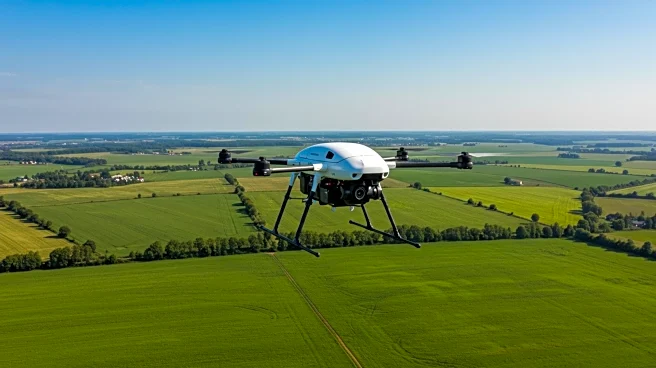What's Happening?
Precision agriculture is revolutionizing farming practices in Canada and the United States, driven by technological advancements such as AI, data analytics, and IoT sensors. By 2025, over 60% of Canadian agriculture jobs will require skills in precision technology and data analysis. The USDA is promoting research and programs to foster technology adoption and workforce development in the US, while Canada is seeing significant government support for agritech startups and digital farm systems. This shift is creating new job opportunities across the agricultural value chain, requiring professionals to blend traditional crop knowledge with cutting-edge technology.
Why It's Important?
The integration of precision agriculture technologies is crucial for improving productivity, resource management, and sustainability in farming. As these technologies become more prevalent, they are reshaping the employment landscape, opening doors for skilled professionals in both Canada and the US. This transformation supports environmental sustainability by reducing chemical run-off and optimizing resource use, while also addressing challenges like climate variability and evolving consumer expectations. The growth in precision agriculture jobs is expected to boost Canada's agri-tech sector by 25% in 2025, highlighting the importance of digital proficiency in future-proofing careers.
What's Next?
As precision agriculture continues to evolve, we can expect further advancements in autonomous machinery, AI-driven decision tools, and digital farm management platforms. These technologies will enhance efficiency and productivity, reducing labor costs and environmental impacts. Educational institutions are updating curricula to include these technologies, bridging the skills gap in agriculture. The focus on climate-smart solutions will also increase, with smarter water management and carbon footprint tracking becoming integral to sustainable farming practices. These developments will continue to drive job growth and innovation in the agri-tech sector.
Beyond the Headlines
The adoption of precision agriculture technologies raises ethical and cultural considerations, particularly in terms of data privacy and the impact on traditional farming communities. As technology becomes central to agricultural operations, there is a need to ensure equitable access and support for small-scale farmers. Additionally, the shift towards digital platforms and AI-driven tools may require new regulatory frameworks to address transparency and accountability in the agricultural supply chain. These factors will play a significant role in shaping the future of farming and the broader societal implications of technological integration.










